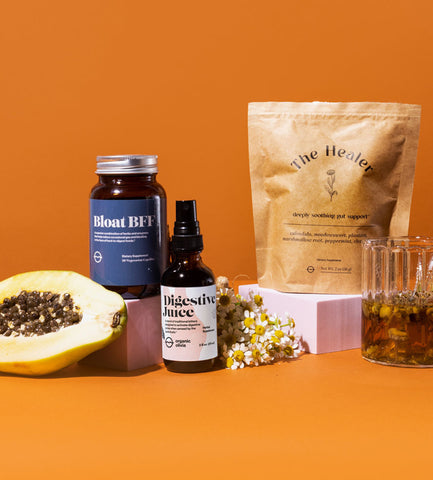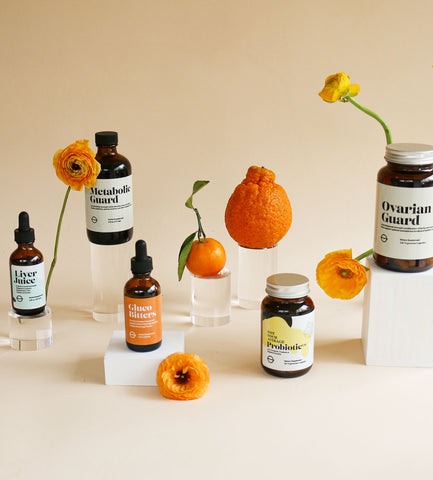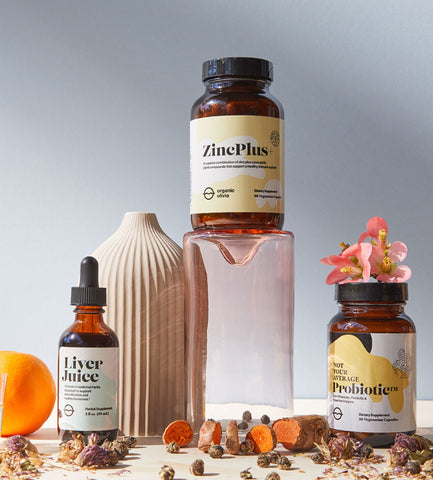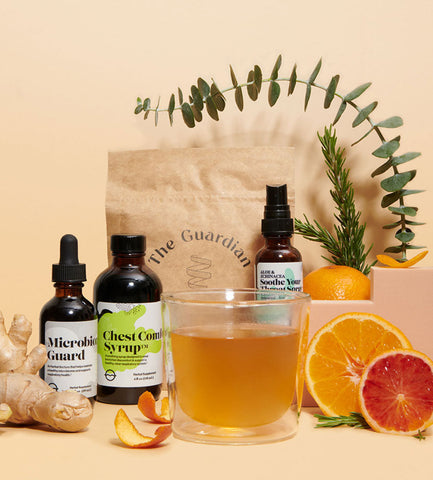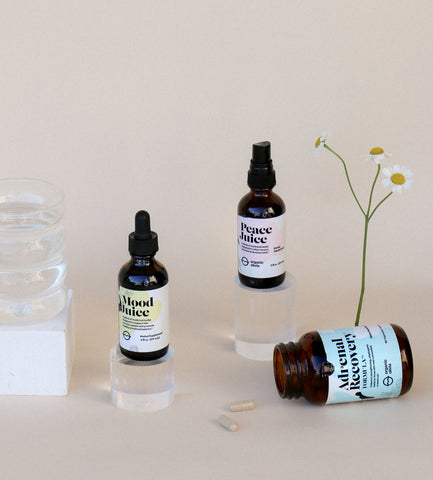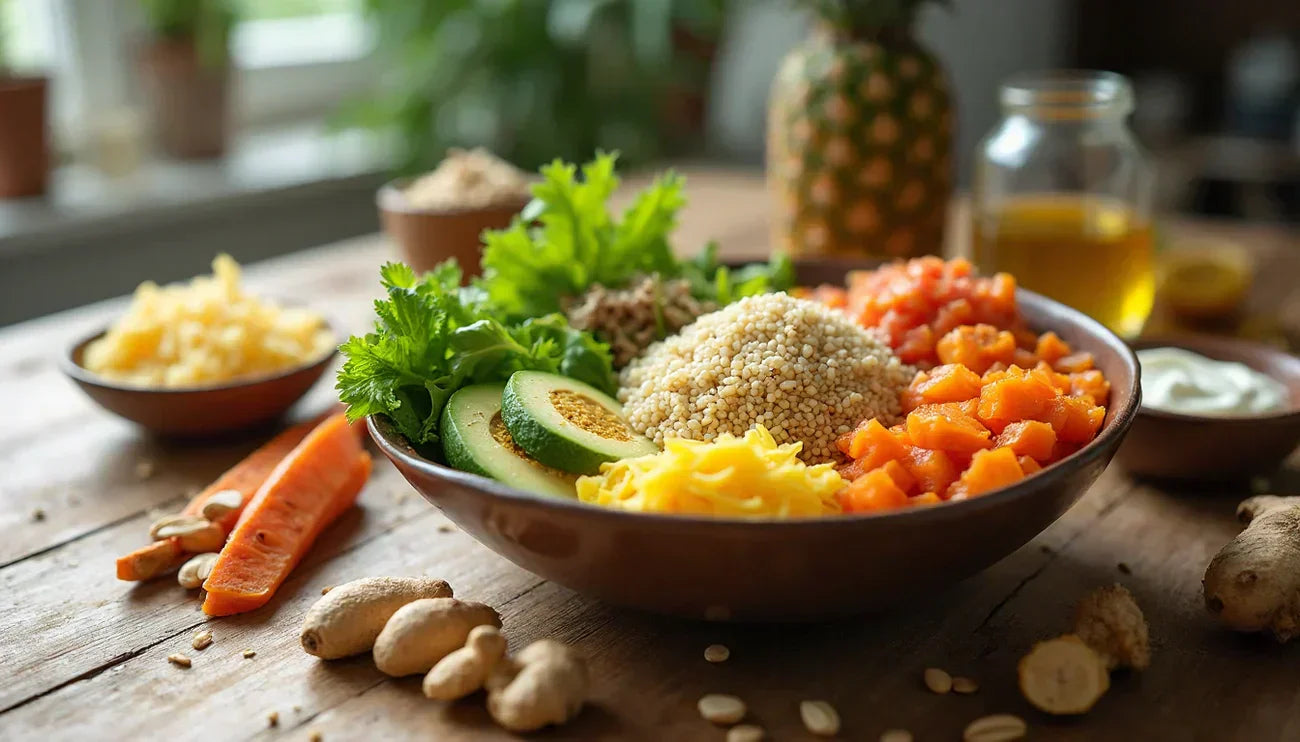Probiotics might sound like a health buzzword, but their impact on your digestion is real, and pretty impressive. These tiny microorganisms help keep your gut in balance, support smoother digestion, and can even boost how your body feels day to day. But what are probiotics exactly? They're live bacteria that, when taken in the right amounts, provide real benefits to your overall health, especially your digestive system.
Your gastrointestinal tract is home to trillions of bacteria. When the balance gets thrown off, you start experiencing uncomfortable symptoms. Bloating that makes your clothes feel tight. Irregular bowel movements that leave you feeling sluggish. Even a weakened immune system that makes you more susceptible to getting sick.
The benefits of probiotics
Probiotics are beneficial bacteria that help restore balance in your intestinal microbiome. They're essentially reinforcements for the good guys already living in your digestive system. These helpful organisms team up with your existing gut bacteria to get things running smoothly again. Studies show they can significantly reduce abdominal pain, gas and bloating — especially if you're dealing with IBS or other digestive disorders.
The benefits don't stop at digestion, though. A healthy gut microbiome strengthens your immune system, tames gut inflammation, and keeps you regular. Remember, nearly 80% of your immune system lives in your gut! When your digestive system is happy, your whole body feels better.
So if you’re struggling with poor digestion or uncomfortable bloating, you're not alone. The good news is that the right probiotic supplement can make a real difference. You'll learn exactly which probiotic strains work best for specific digestive issues, what to look for in probiotics if you're a woman with unique needs, and how targeted probiotic formulations can help restore your gut health naturally.
Digestive Problems Probiotics Can Actually Fix
Different strains target different digestive issues. It's not a one-size-fits-all situation. Think of it like having the right tool for the right job. Let's break down which probiotics work best for the most common gut problems.
Bloating and Irregular Bowel Movements
That uncomfortable feeling when your stomach looks six months pregnant after eating? Probiotics can help with that. Have gas and bloating had you avoiding social situations? There's hope for that, too.
Studies show that specific probiotic strains from the Bifidobacterium and Lactobacillus families are particularly good at reducing bloating and getting your bowel movements back on track. These beneficial microbes work by speeding up how quickly food moves through your gastrointestinal tract and restoring the natural balance of your intestinal microbiota.
Bacillus coagulans is one strain that really stands out. Research shows it's remarkably effective at reducing bloating, abdominal pain, and constipation. Most people start noticing improvements within a few weeks of taking probiotics consistently. Your intestinal microbiome doesn't change overnight, but with patience, you can see real results.
Diarrhea From Antibiotics
Antibiotics are lifesavers when you need them. Unfortunately, they don't just kill the bad bacteria causing your infection — they wipe out a lot of the good bacteria too. Up to 30% of people taking antibiotics end up with diarrhea as a result.
Here's where probiotics really shine. Research shows that taking a probiotic supplement alongside antibiotics reduces your risk of getting diarrhea by 37%. For kids, probiotics lower this risk by 11%. The strains Lactobacillus rhamnosus and Saccharomyces boulardii work particularly well. You'll want to look for doses between 5-40 billion CFU (colony-forming units) daily, and the good news is they have minimal side effects.
IBS and IBD Symptoms
If you're dealing with Irritable Bowel Syndrome (IBS) or Inflammatory Bowel Disease (IBD), you know how unpredictable and frustrating these conditions can be. The cramping, the urgent bathroom trips, the constant worry about when symptoms will flare up.
Clinical studies show that probiotic treatment can significantly improve the overall symptoms of IBS, including abdominal pain and bloating. The results are impressive — for every 7 people who take probiotics for IBS, at least 1 will experience meaningful improvement. That's pretty encouraging odds!
Even if you have IBD, probiotics can help. Up to 32.5% of people with IBD also experience IBS-like symptoms. Probiotics help by strengthening your gut barrier function and reducing inflammation. Bifidobacterium infantis has shown particular promise for calming IBS symptoms.
Lactose Intolerance
Love ice cream but hate how it makes you feel? It’s a common struggle. Millions of people struggle with lactose intolerance, but probiotics offer a natural way to enjoy dairy again.
A comprehensive analysis of research found that probiotics significantly reduce lactose intolerance symptoms — including abdominal pain, diarrhea, and gas. The strains Limosilactobacillus reuteri DSM 17938 and Lactobacillus acidophilus DDS-1 showed the most impressive results.
These probiotic bacteria work by producing beta-galactosidase, an enzyme that acts like lactase to break down lactose in your gut. It's like giving your digestive system the tools it needs to handle dairy properly.
The right probiotics really can make a dramatic difference in how you feel every day.
How Probiotics Support Your Gut and Immune System
The connection between your intestinal microbiome and overall health goes way beyond just digestion. With approximately 70% of your immune system located in your intestines, understanding how probiotics actually work can be a game-changer for anyone dealing with poor digestion, low immunity, and uncomfortable bloating.
How Do Probiotics Work in Your Gut?
Probiotics don't just sit around in your digestive system doing nothing. They get to work through several fascinating mechanisms that help restore balance to your gut.
First, they play a game of "musical chairs" with harmful bacteria. Probiotics compete for nutrients and attachment sites along your intestinal lining. When the good guys take up all the prime real estate, there's less room for the troublemakers that cause digestive discomfort.
Probiotics also act like tiny construction workers, strengthening your gut barrier function. They boost the production of tight junction proteins, which essentially seal the gaps between intestinal cells. This prevents harmful substances from sneaking into your bloodstream where they don't belong. They also ramp up mucin protein production, creating a protective layer along your intestinal wall.
Here's something really cool: beneficial microbes produce short-chain fatty acids (SCFAs) that serve as fuel for the cells lining your colon. One particular SCFA called butyrate is especially important. It helps calm gut inflammation and strengthens your gut barrier by beefing up the mucus layer.
The Gut-Immune System Connection
Your gut houses something called gut-associated lymphoid tissue (GALT), which makes up the largest part of your immune system. Probiotics interact directly with this tissue, influencing both your immediate immune responses and your body's ability to remember and fight specific threats.
Some probiotics can actually increase the number of intestinal IgA-producing cells. These are special antibodies that act like bouncers, catching toxins and infectious agents before they can cause trouble in your respiratory and intestinal tissues. Studies show that probiotics can boost intestinal IgA levels by up to 87% with consistent use.
Probiotics also work with your immune cells — dendritic cells, macrophages, and T and B lymphocytes — to fine-tune your immune responses. They help macrophages become more efficient at gobbling up and destroying invading pathogens.
Probiotics Do More Than Fix Digestion
The gut health benefits of probiotics reach far beyond your digestive tract. The gut-brain connection allows these beneficial bacteria to influence your mental health by producing neurotransmitters that affect mood and brain function. Research suggests probiotics may help with depression, anxiety, and even support brain health as we age.
Probiotics also help calm the inflammatory processes that can mess with your skin barrier. This explains why more and more people are turning to probiotics for skin conditions like eczema and acne.
Specialized formulations like Organic Olivia's Not Your Average Probiotic take advantage of these wide-ranging benefits. Instead of just targeting digestive issues, these carefully crafted blends support immune function and overall wellness by including specific probiotic strains that work on multiple body systems at once.
How to Pick the Right Probiotic for You
Walking down the supplement aisle can feel overwhelming when faced with dozens of probiotic options. The good news is that choosing the right one doesn't have to be complicated once you know what to look for.
A Probiotic Strain Matters More Than You Think
Here's something most people don't realize: not all probiotics are created equal. The naming system works like a person's full name — genus (like Lactobacillus), species (like acidophilus), and strain (like "GG"). All three parts matter tremendously. Think of it as a first, middle, and last name.
Why does this matter? Different strains produce completely different results, even within the same species. It's like how two people with the same first and last name can be totally different individuals.
For digestive troubles, research shows Lactobacillus rhamnosus GG works well for reducing bloating, while Saccharomyces boulardii tackles antibiotic-associated diarrhea effectively. If constipation is your main issue, Bifidobacterium strains often provide the best relief. Bifidobacterium lactis, for example, has shown promising results in improving bowel regularity.
When it comes to dosage, look for products containing 1-10 billion CFU per dose. This range typically provides therapeutic benefits without breaking the bank on unnecessarily high doses.
What Women Need to Know About Probiotics
Women have unique probiotic needs, especially when it comes to vaginal and urinary health. Your vaginal microbiome is just as important as your gut microbiome for overall wellness.
For maintaining healthy vaginal flora, strains like Lactobacillus crispatus and Lactobacillus rhamnosus have proven effective in preventing bacterial vaginosis. Studies show women taking specific probiotic bacteria see a reduction in both severity and recurrence of vaginal infections. Lactobacillus acidophilus is particularly helpful for maintaining proper vaginal pH balance naturally.
How to Tell Your Probiotic is Actually Working
Starting a new daily probiotic? Here's what to watch for:
-
Reduced bloating and stomach discomfort within 1-2 weeks
-
More regular bowel movements — research shows regular probiotic users are 10% more likely to have daily bowel movements
-
Better sleep quality thanks to the gut-brain connection
-
Improved mood and mental clarity as beneficial microbes produce important neurotransmitters
Patience is key here. It typically takes 6-8 weeks to notice substantial improvements. If you're not seeing benefits after this time frame, you might need a different strain or formulation that better suits your specific needs.
Organic Olivia's Not Your Average Probiotic contains multiple clinically-studied strains specifically chosen to restore gut balance and ease digestive discomfort. The targeted approach addresses the root causes of poor digestion and bloating rather than just masking symptoms.
Simple Daily Habits That Support Your Gut Health
You've learned how probiotics can fix your digestive problems. Now let's talk about the daily habits that can make your probiotics even more effective. The right combination of simple practices creates an environment where beneficial bacteria can thrive.
Feed Your Good Bacteria the Right Fuel
Here's something most people don't know: probiotics need food to do their job properly. That's where prebiotics come in. These plant fibers are like fertilizer for your beneficial bacteria, helping them multiply and become more effective. Together, they create what's called a "synbiotic" effect.
You can easily add prebiotics to your diet with foods like bananas, apples, onions, garlic, whole grains, and flaxseeds. Think of it this way — you're providing both the good bacteria and their food supply in one go!
Hydration and Diet Basics That Actually Matter
Water is crucial for digestion. It helps dissolve food and transport nutrients to your cells. Men should aim for about 3.7 liters daily, while women need approximately 2.7 liters.
Fiber works like a sponge, absorbing water to support regular elimination. Aim for 25-38 grams daily. Here are some simple ways to support your digestive system:
-
Choose non-fizzy, non-caffeinated drinks like herbal teas and plain water
-
Eat water-rich fruits and vegetables such as watermelon, cucumbers, and berries
-
Cut back on ultra-processed foods loaded with added sugars
-
Incorporate fermented foods like yogurt and kefir into your diet for an extra probiotic boost
These changes might seem small, but they make a big difference in how your gastrointestinal tract functions.
Why You Can't Skip Days With Probiotics
Taking probiotics here and there won't give you lasting results. Unlike your body's natural bacteria, probiotics don't permanently set up shop in your gut — they pass through your system doing their work along the way.
This means daily supplementation is key to maintaining a stable population of beneficial bacteria. Factors like poor diet or stress can easily disrupt this balance. Consistency is everything when it comes to probiotics!
A Probiotic That Actually Delivers Results
If you're looking for a solution that covers all your bases, the combination I dreamed of after so many years is all packed in one capsule. Not Your Average Probiotic offers a unique 3-in-1 formula. Each capsule contains 20 billion CFU across 16 different strains, plus prebiotic fiber and fermented enzymes — all designed to support microbiome diversity and reduce occasional bloating.
The microencapsulation technology protects these live microorganisms from stomach acid, delivering them directly to your intestinal microbiota where they can do the most good. Users often report noticeable improvements in elimination and reduced gas within hours of taking it. That's the kind of fast relief you're looking for!
Take Back Your Digestive Health
Probiotics can be game-changers for your digestive health. You've learned how these beneficial bacteria tackle bloating, irregular bowel movements, and even antibiotic-related digestive issues. More importantly, you now know that your gut health affects your entire body — from your immune system to your mood.
The key is choosing the right probiotic strains for your specific needs. Lactobacillus rhamnosus for bloating relief. Saccharomyces boulardii to prevent antibiotic-associated diarrhea. Women need specific strains like Lactobacillus crispatus for vaginal health support.
Consistency is everything. These beneficial microbes don't set up permanent residence in your gut. They do their work and move on. That's why daily probiotic supplementation gives you the best results. Pair them with prebiotic foods, and you're giving your good bacteria exactly what they need to thrive.
If you're dealing with persistent digestive disorders, don't settle for feeling uncomfortable. The Not Your Average Probiotic capsule brings together 16 carefully selected strains with prebiotic fiber and digestive enzymes. The microencapsulation technology protects these organisms so they actually reach your gastrointestinal tract alive. Many people notice improvements in gas and bloating within hours.

Not Your Average Probiotic
An advanced prebiotic, probiotic, enzyme blend designed to support gut microbiome diversity, skin health, digestion and elimination.*
STAR HERB: Lactobacillus rhamnosus GG.
Your gut health is the foundation of your overall wellness. When you invest in healing your digestive system, you're investing in your energy, immunity, and quality of life. You don't have to accept bloating, irregularity, or digestive discomfort as normal. You have the power to change how you feel, starting with what you put in your body every day. Consider adding a high-quality probiotic supplement to your daily routine and experience the transformative gut health benefits for yourself.



